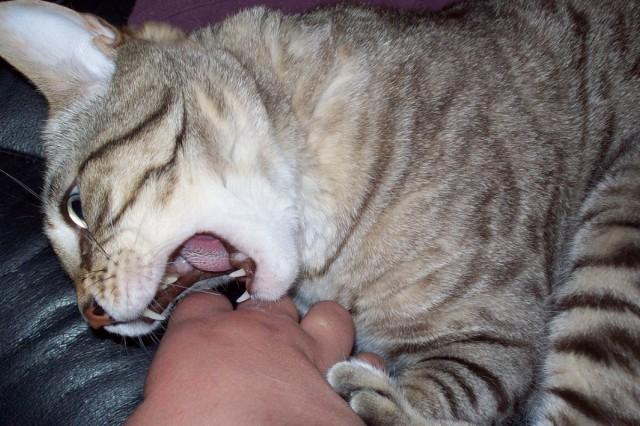
Cat Bites: Understanding the Causes, Symptoms, and Treatment
Have you ever found yourself dealing with a cat bite? It’s a situation that can be quite unsettling, especially if it’s your first time. Cat bites can range from minor to severe, and it’s important to understand the causes, symptoms, and treatment options to ensure proper care. In this article, we’ll delve into the various aspects of cat bites, providing you with a comprehensive guide to help you navigate through this situation.
Causes of Cat Bites
Cat bites can occur for a variety of reasons. Understanding the causes can help you prevent future incidents. Here are some common reasons why cats might bite:

-
Playfulness: Cats are playful creatures, and sometimes they might bite during play, especially if they’re not used to being handled or if they’re feeling overwhelmed.
-
Aggression: Cats can become aggressive if they feel threatened, scared, or if they’re defending their territory or territory of another pet.
-
Pain or Illness: A cat might bite if it’s in pain or feeling unwell, as a way to communicate its discomfort.
-
Teething: Young kittens may bite as they’re teething, as it helps them to relieve the discomfort of their growing teeth.
Recognizing the Symptoms
Identifying the symptoms of a cat bite is crucial for prompt treatment. Here are some common signs to look out for:
-
Pain and Swelling: The bitten area may become painful and swollen, which can be a sign of infection.
-
Redness: The skin around the bite may turn red, indicating inflammation.
-
Discharge: A cat bite can lead to the formation of pus, which may ooze from the wound.
-
Lack of Appetite: If your cat is not eating or drinking, it could be a sign that the bite has affected its overall health.
Treatment Options
When dealing with a cat bite, it’s important to take immediate action to prevent infection and promote healing. Here are some treatment options to consider:
-
Clean the Wound: Gently clean the bite with mild soap and water to remove any debris or bacteria. Be sure to wash your hands before and after handling the wound.
-
Apply Antibiotic Ointment: Apply an over-the-counter antibiotic ointment to the bite to help prevent infection.
-
Bandage the Wound: Cover the bite with a sterile bandage to protect it from further contamination and to keep it clean.
-
Seek Medical Attention: If the bite is deep, shows signs of infection, or if you’re unsure about the severity, it’s important to consult a healthcare professional.
Preventing Future Cat Bites
Preventing cat bites is essential for the safety and well-being of both you and your feline friend. Here are some tips to help you reduce the risk of future incidents:
-
Spay or Neuter: Spaying or neutering your cat can help reduce aggressive behavior and the likelihood of biting.
-
Positive Reinforcement: Reward your cat with treats and praise when it behaves well, reinforcing good behavior.
-
Regular Vet Check-ups: Keep your cat up-to-date on vaccinations and regular vet check-ups to ensure its overall health.
-
Handling with Care: Always handle your cat gently and avoid sudden movements that might startle it.
Conclusion
Cat bites can be a concern for both cat owners and their pets. By understanding the causes, recognizing the symptoms, and taking appropriate treatment measures, you can ensure proper care and prevent future incidents. Remember to always handle your cat with care and provide a safe and loving environment for your feline friend.
| Causes of Cat Bites | Sym
Related Postsbullseye insect bite,Bullseye Insect Bite: A Detailed OverviewBullseye Insect Bite: A Detail… Like |
|---|





